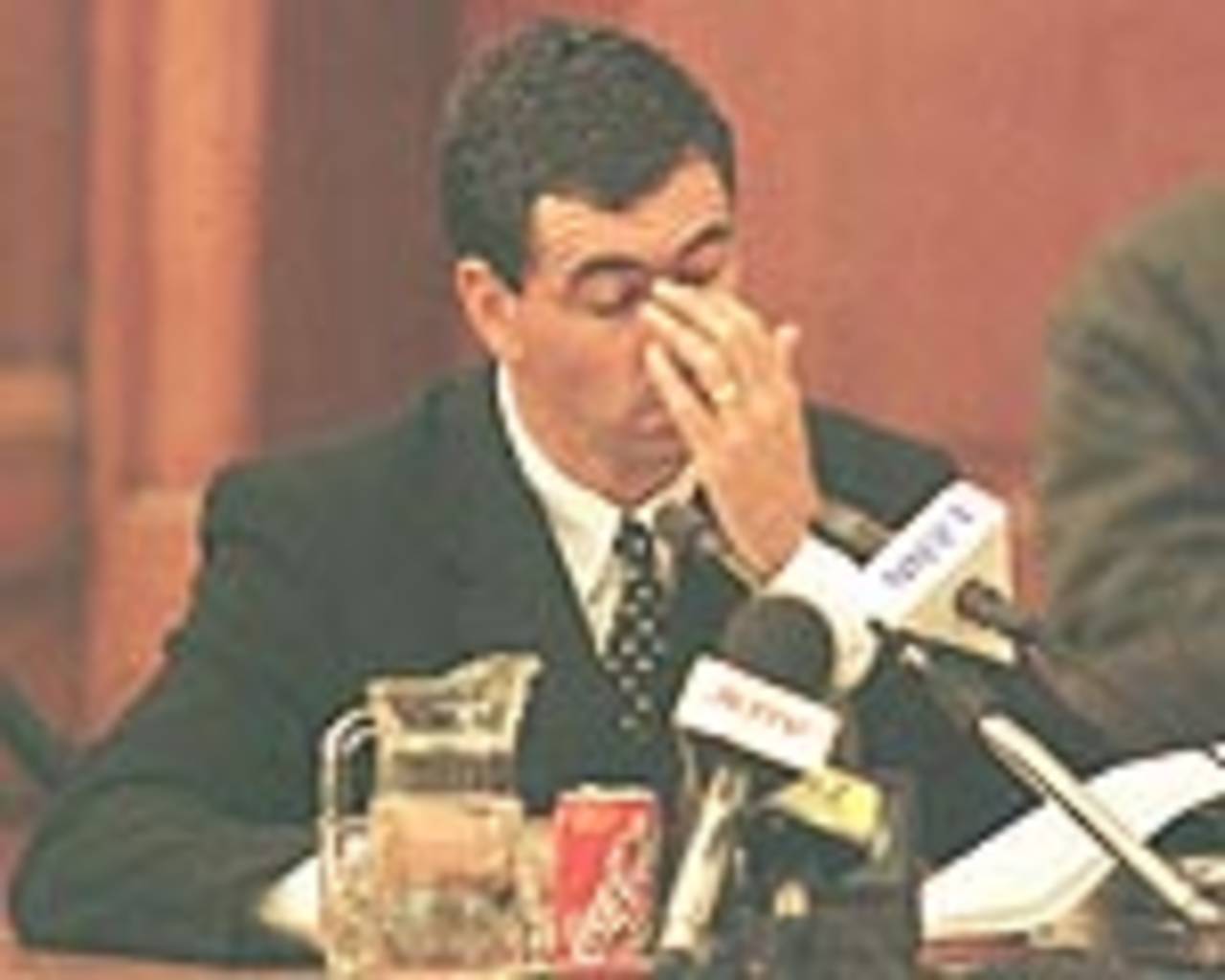Forgive H***** C*****? Not me
In the background was a shot of a barely-occupied South African ground in the middle of a Test
Rob Steen
25-Feb-2013

AFP
I’ve just finished watching a BBC TV documentary about a recent former captain of South Africa, someone I hesitate to dignify as a “man”, someone on whom I hoped I would never waste another word. To be honest, I can hardly bring myself to type his name. So please forgive these brief thoughts on the subject of H***** C*****.
It was, remarkably to some no doubt, the first time I’d seen coverage of the King Commission, seen the way the falling icon had suddenly aged; the clarity of the voice undercut by the shiftiness of the speaker; those moony child-like eyes, imploring for forgiveness; the tears; the two men it took to escort his buckling body from court. For the first time, too, I saw the poker-faced denials to television cameras, not to mention those three wides Henry Williams bowled in that fateful opening over in India.
Even though the dots were never completely joined up, what came across most clearly was what I had always suspected: that, at bottom, as Dr Ali Bacher hinted, it was C*****’s refusal to help the transformation/integration process – or even acknowledge that it was important - that did most to fuel the anger and cynicism that ultimately allowed him to take money and gifts from Marlon Aronstam and others. A cynicism that made it oh-so-easy to bring two insecure coloured players, Williams and Herschelle Gibbs, into his web of conceit and deceit. That, for me, was his greatest crime.
Speaking three months before his death, Bob Woolmer told of how his former captain had recently reiterated to him, shortly before Cronje’s fatal air crash, that, while he may have taken the money, he vowed he had never fixed a match. Aronstam, the chap who gave C***** a leather coat for his wife (plus a few thousand dollars) in exchange for purportedly breathing life into the sodden 2000 Centurion Test against England, inferred otherwise, but then trusting a bookie is never a shrewd move. Then again, occupying the same bed as one, if you are a professional sportsman, is not all that much cleverer. The only guarantees are that a) the sex won’t be that hot and b) you will emerge in a lot worse ethical and moral shape.
All too credible was the theory that C*****, as captain, had grown too powerful, that Woolmer and even Bacher, to an extent, had bowed to his strength, success, popularity and overweening white pride. Yet one of the most poignant and telling observations came from Tim Noakes, professor of exercise and sports science at the University of Cape Town, who suggested C***** fell prey to insecurity rather than greed alone. His own insecurity, yes, but the implication, in keeping with the first half of Paul Yule’s judicious and moving programme, was that this was also the insecurity of any Afrikaaner, or any white South African for that matter, in the face of the post-Mandela world, a world in which they could no longer run sport in the Republic as a fiefdom, for their own exclusive gratification. For once, Bacher came out of it all rather well, as a well-meaning, harassed sales manager unable to halt the shady gambits and unscrupulous ruses of his most dynamic salesman.
The other most resonant comment came from the headmaster of C*****’s public school, Greys College, the bloke who had coached him as a boy. To him, the game was no longer the same, no longer as captivating or trustworthy, no longer as worthy of his love and devotion. And that, he regretted, was down to C*****.
In the background was a shot of a barely-occupied South African ground in the middle of a Test. Someone suggested that this was assuredly no coincidence, that the game there has yet to recover. For my part, I now think twice before accepting any close finish at face value. Public distrust, rampant cynicism and a game forever scarred: such is the legacy of H***** C*****.
Cricket, according to my own heartfelt prejudices, has been polluted by one criminally soulless conspiracy – the cabal of politicians and administrators that initially kept Basil D’Oliveira out of the 1968-69 MCC party to South Africa - and three villains: WG Grace, Douglas Jardine, and H***** C*****. Arrogant, ruthless, actual or spiritual cheats all three. I can forgive WG because I’m ultimately grateful for his existence: the game might never have gained a secure foothold in the wider global consciousness without him. I can forgive Jardine, just about, if only because he was no more focused on the Ashes than Ian Chappell or Steve Waugh, and also because of the way he was cast aside once he’d outlived his usefulness. H***** C*****? When I’m 64, maybe, but not yet. Not by a long chalk.
Rob Steen is a sportswriter and senior lecturer in sports journalism at the University of Brighton